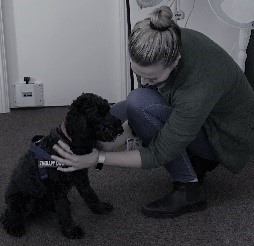There’s absolutely no data on the number of dogs currently working in schools across the United Kingdom. There are also no scientific conclusions on the impact of having dogs in schools. There. I’ve said it. There’s nothing out there for me to base the truth of this blog on…so why am I writing it?
Because having a school dog has made a huge difference at our school.
Did you, for example, realise that having a school dog could improve the reading skills of young people? Or raise their self-esteem? Or help them to make friends?
As a headteacher, having a full-time school dog has quite literally been a revelation. It wasn’t an easy decision to make initially. I am naturally quite a risk-averse leader who bases most of my important decisions on a thorough, careful scrutiny of all the evidence I can get my hands on.
I always try hard to read evidence which both supports my instinct but, also take into account information that is counter to my instinct before I come to a decision. Clearly, this need for evidence proved problematic in the preparation for the decision to have a school dog as there’s simply nothing concrete out there.
The school had had a dog before, for a couple of days a week which had proved popular with our students. But the feeling among the Well-being Team in our school was that there was a lot more we could do… if only we had our own full-time dog.
They really believed that anything was paws-ible…
So, two years ago we took a leap of faith and employed Bramble, our school dog – a black, 2-year-old Cockapoo (in case you’re wondering, she’s paid in affection, walks and treats!).
Here she is in one of her favourite places – in my office on my chair!
“Dogs are a powerfully cost-effective way of helping children feel more secure at school and a low-tech approach to reducing anxiety”. Sir Anthony Seldon (Vice Chancellor University of Buckingham).
I couldn’t agree more.
Before we welcomed Bramble into our school, all parents and carers were asked for their consent (or not) for their child to be allowed access to her. We have always been very clear that she is not an Assistance Dog and she is not a Pets As Therapy Dog (in other words, she’s not formally trained to any nationally recognised standard). She is, quite simply, our school dog and part of our Well-being Team, joining our Well-being Officers and our Clinical Psychologist and Psychotherapist.
How did we choose her?
Of course, when we chose her, there were certain things we needed, like she had to:
- Be non-allergenic for people with allergies
- Have a great temperament and a friendly demeanour
- Be a breed recognised as one that makes a good therapy dog and a good companion.
But other than this, we were open to any breed.
How does she help?
Since her arrival at our school, we have used Bramble in a wide range of activities and the results are remarkable – with some even we didn’t expect. Just a few of the ways she’s helped our students:
To improve the reading confidence of our students
Students who have found it challenging to read aloud in front of peers have been supported to read to Bramble outside of their classroom instead. Her non-threatening, friendly response has led to many students being able to transfer their growing reading confidence into their classroom over time.
To reduce anxiety
We’ve found that students who felt unable to speak directly to a member of staff about their concerns have been able to talk to Bramble about what’s on their mind. They’ve told her of their fears with a member of our team in the room, and we’ve been able to respond to their issues directly as a result.
To improve the ability to think of others
We’ve been able to develop empathy skills in our students using Bramble. We’ve supported students to follow care routines and guidelines for her, teaching them to put her needs before their own.
We’ve taught them about the need to use a calm and quiet voice and small movements in order to get a positive response from Bramble. This has then allowed our team to generalise the need to, and importance of, thinking of others as well as ourselves, along with considering how our reactions make others feel.
To provide companionship and a friendly welcome to school
Bramble has been cited by parents and carers more times than I can count as the reason my child could make it into school. In my previous blog Why school refusal shouldn’t be seen as school rejection I spoke about the overwhelming levels of anxiety that some young people feel about school.
The offer of time with our school dog has on many occasions been the vital initial stage in getting a young person over our threshold and enabling them to take that first, tentative step towards getting back into school and fulfilling their potential.
My theory (totally unscientifically backed of course!) is that Bramble provides our students with an endlessly non-judgemental response to everything they do and say. She allows our students to be themselves without comment or judgement and, through her, they grow in confidence with their peers.
But it’s not just about what our school dog offers our students. Just like every headteacher in the country, I am also always looking for ways to improve the well-being of our most valuable resource…our staff. The impact that our school dog has on the well-being of our staff can’t be underestimated either.
She welcomes the staff in a morning as they come in and the unbridled joy she brings on cold, wet, dark mornings over here in the Peak District is often infectious. Our days generally begin with a smile when she’s on site and when days begin with a smile, they tend to be more productive than when they don’t wouldn’t you agree?
But what about those staff who don’t like dogs?
We are very clear with our staff about the locations in which they can expect to encounter Bramble. This allows all staff who aren’t keen on dogs to move around the site confidently. In fact, at least two of our staff who weren’t keen on dogs before they worked with Bramble have now changed their mind about dogs.
And how do I know that she’s having a positive impact? It’s on the faces of the staff and students who spend time with her and in the feedback I get from the parents and carers of our students.
And now for the science bit…
The positive impact of Bramble in all aspects of our school life has been dramatic and while I have no scientific evidence to support this hypothesis (other than she receives more Christmas cards than I do!) – I couldn’t be more certain of its truth…
If you want to learn more about the positive impact that a school dog can have for young people with High Functioning Autism, come and see us. But be sure to call in advance because Bramble’s diary gets pretty full, pretty quickly!
About me:
I am Sara Forsyth, the Headteacher of Alderwasley Hall School and Sixth Form and I have almost 25 years’ experience in SEND, in particular working with young people with Autistic Spectrum Disorders. Alderwasley Hall School and Sixth Form is an exceptional independent SEN school for young people with ASD and associated needs in Derbyshire.























